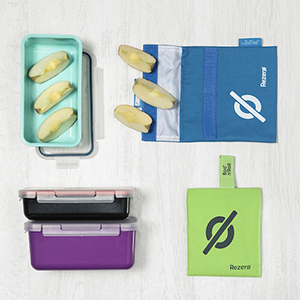
From the lockdown of the entire Rezero team, we hope you are all well.
These days and the months that await us will be really difficult for everyone, but we are convinced that this whole episode will end. In any case, now is a good time to reflect on whether the COVID19 pandemic will have a positive side effect on relocation, proximity products and craftsmanship. In other words, can it help us reduce the impacts of our consumption and value what our land and our people offer us?
Today we want to share one of the questions we have heard these days: is the use of reusable containers safe in times of pandemics such as Covid-19?
First and always, we should consult reliable sources. We know that the plastics industry is using this episode as an opportunity to lobby administrations in favour of their business by promoting plastic packaging as safer. We believe that they are being selfish and opportunistic at a time when most of us are thinking about how to work together to get out of this situation. See news
As recommended by the World Health Organization and the Centre for Disease Prevention and Control, as well as regional and state governments, it is essential to wash hands frequently, adopt respiratory hygiene measures (when coughing or sneezing, covering your mouth and nose with elbow flexed), and clean and disinfect all surfaces that we touch frequently on a daily basis, among others.
If we consider the containers or objects that we can use on a daily basis such as coffee cups, glasses, plates, etc. or tupperwares for shopping, the recommended measures are essential to maintain hygiene standards and prevent the spread of the virus. Therefore, if maintaining these hygiene and disinfection practices, there is no reason to encourage the use of disposable containers and objects over reusable ones, except in hospital conditions where it may be necessary. Therefore, and as should always be, it is enough to maintain the hygiene of reusable containers, wash them well with soap and hot water.
Single-use containers are no safer compared to properly washed reusable ones. Disposable packaging goes through the entire food chain from manufacturing, transportation, inventory storage and eventual use. Therefore, they are more likely to harbour pathogenic viruses and bacteria. We also know that over 12,000 chemicals are used in plastic food packaging, and many of them are dangerous to human health. The migration of these toxic chemicals from single-use products to our food and beverages is therefore not an issue affecting reusable non-plastic packaging.
Furthermore, disposable plastics can take up to 600 years to degrade in our environment and their massive use continues to grow in our society. Therefore, it is not logical that, instead of promoting the necessary hygiene and cleaning measures, we take steps back and return to a model that floods our environment with a material that will take hundreds of years to disappear, with the associated environmental and human health damages.
We always encourage you to continue using reusable packaging. And, if you wish, the Rezero kit is available when lockdown is over.
Source: Rezero, 2019
Buy the kit Rezero